The BBVA share
The Global economy is being severely affected by the COVID-19 pandemic. Supply, demand and financial factors caused an unprecedented fall in GDP in the first half of 2020. Supported by strong fiscal and monetary policy measures, as well as by greater control over the spread of the virus, global growth rebounded in the third quarter and is expected to continue this trend in the fourth quarter, although at a slower rate since the number of infections remains very high and it is even rising in some areas of the world. With respect to the coming year, activity recovery is expected to gain traction. The expected approval and distribution of effective COVID-19 vaccines and treatments will likely allow for a progressive relaxation of social distancing measures over the coming year, starting in the main world economies, followed by the rest.
Following the massive fiscal and monetary stimuli to support economic activity and reduce financial tensions, government debt has increased across the board, and interest rates have been cut and are now at historically low levels. Additional countercyclical measures may be required. Similarly, no significant reduction in current stimuli is expected, at least until the recovery takes hold.
Tensions in the financial markets have moderated rapidly since the end of March, following the decisive actions taken by the main central banks and the significant fiscal packages announced in many countries. In recent months, markets have shown relative stability and, at certain times, risk-taking movements. However, caution remains in the financial markets, with safe-haven assets in great demand, especially since the end of the summer. Financial volatility is expected to remain relatively high until the end of the year, mainly due to the still negative evolution of the pandemic and the United States presidential election. Besides, progress regarding coronavirus vaccines and treatments should pave the way for a gradual decline in financial volatility throughout 2021.
BBVA Research estimates that global GDP will contract by around 2.9% in 2020 and expand by around 5.4% in 2021. The recovery in terms of activity will be incomplete and heterogeneous. Also, epidemiological, financial and geopolitical factors are keeping an exceptionally high uncertainty.
With regard to the banking system, in an environment in which much of the economic activity has been at a stand still for several months, the services provided have played an essential role, basically for two reasons: firstly, banks have ensured the proper functioning of collections and payments for households and companies, thereby contributing to the maintenance of economic activity; and secondly, the granting of new lending or the renewal of existing lending has reduced the impact of the economic slowdown on household and business income. The support provided by the banks over the months of lockdown and the public guarantees have been essential in avoiding liquidity and solvency problems for companies, meaning that banking has become its main source of funding.
In terms of profitability, European and Spanish banking remain far from the levels seen before the crisis, mainly driven by the recognition of high provisions for impairment on financial assets in the first two quarters of 2020 by many banks as a result of the worsening of the macroeconomic environment following the outbreak of the pandemic. In addition, there has been accumulation of capital since the previous crisis and the interest rate environment has been very low for several years. Nevertheless, banks are facing this situation from a healthy position with constantly increasing solvency since the 2008 crisis, with reinforced capital and liquidity buffers and, therefore, with a greater lending capacity.
The main stock market indexes had a mixed performance during the third quarter of 2020. In Europe, the Stoxx Europe 600 index remained stable, with a slight increase of 0.2%, and in Spain, the Ibex 35 decreased by -7.1% in the quarter. In the United States, the S&P 500 index had a quicker recovery and rose by 8.0% during the period.
With regards to the banking sector indexes, their performance in the third quarter of the year was worse than that of the general indexes. In Europe, the Stoxx Europe 600 Banks index, which includes banks in the United Kingdom, and the Euro Stoxx Banks, the banks index for the Eurozone, decreased by -12.1% and -13.2%, respectively. In the United States, the S&P Regional Banks Select Industry Index decreased by -7.0% during the quarter.
For its part, the BBVA share price decreased by -22.6% in the quarter, showing a slightly worse performance than the sector in Spain (Ibex 35 Banks index decreased by -18.5%), closing September at €2.37
BBVA share evolution
Compared with European indexes (Base indice 100=31-12-19)
BBVA
Stoxx Europe 600
Stoxx Banks
The BBVA share and share performance ratios
| 30-09-20 | 30-06-20 | |
|---|---|---|
| Number of shareholders | 898,240 | 891,944 |
| Number of shares issued (millions) | 6,668 | 6,668 |
| Closing price (euros) | 2.37 | 3.06 |
| Book value per share (euros) | 6.50 | 6.57 |
| Tangible book value per share (euros) | 5.84 | 5.87 |
| Market capitalization (millions of euros) | 15,816 | 20,430 |
| Yield (dividend/price; %) (1) | 11.0 | 8.5 |
(1) Calculated by dividing shareholder remuneration over the last twelve months by the closing price of the period.
In terms of shareholder remuneration, on March 27th the European Central Bank recommended that at least until October 1, 2020, credit institutions should refrain from distributing dividends or from making irrevocable commitments of paying them, as well as from buying back shares to remunerate shareholders. Consequently, BBVA’s Board of Directors resolved to modify the Group’s dividend policy for 2020 which was announced in the relevant event dated February 1, 2017, determining as new policy for 2020 not to pay any dividend amount corresponding to the 2020 financial year until uncertainties caused by COVID-19 disappear and, in any case, never before the end of such fiscal year. This new policy complies with the extension of the ECB’s recommendation not to pay dividends before January 1. 2021.
Shareholder remuneration
(Euros per share)
Cash
As of September 30, 2020, the number of BBVA shares remained at 6,668 million, of which 45.41% were held by Spanish residents and the remaining 54.59% by non-residents. The total number of shareholders is stood at 898,240 at the end of the quarter.
BBVA shares are included on the main stock market indexes, including the Ibex 35, and the Stoxx Europe 600 index, with a weighting of 4.4% and 0.2%, respectively at the closing of September of 2020. They are also included on several sector indexes, including Stoxx Europe 600 Banks, which includes the United Kingdom, with a weighting of 3.5% and the Euro Stoxx Banks index for the Eurozone with a weighting of 6.8%.
Finally, BBVA maintains a significant presence on a number of international sustainability indexes or Environmental, Social and Governance (ESG) indexes, which evaluate companies'performance in these areas. In September of 2019, BBVA continued to be included in the Dow Jones Sustainability Index (DJSI), the markets leading benchmark index, which measures the economic, environmental and social performance of the most valuables companies by market capitalization of the world, achieving the highest score in financial inclusion and occupational health and safety and the highest score in climate strategy, environmental reporting and corporate citizenship and philanthropy.
Group information
- Year-on-year growth in operating income of 4.1% as of September 2020 (up 17.3% at constant exchange rates) driven by the net trading income (NTI) and a significant reduction in operating expenses, as a result of containment plans and the lower expenses derived from mobility restrictions in certain countries. As a result of the above, there was a significant improvement in the efficiency ratio.
- Impairment on financial assets increased due to the impacts of COVID-19.
- As a result of the valuation of the goodwill of its subsidiaries, the Group estimated that there was an impairment in the United States, which was recorded under the heading "Other results" of the consolidated income statement as of March 31, 2020. This impairment represented an impact of €-2,084m in the net attributable profit, mainly driven by the negative impact of the macroeconomic scenario update, affected by the COVID-19 pandemic. This impact does not affect the tangible net equity, capital, or liquidity of the BBVA Group.
- Finally, the cumulative net attributable loss as of the close of September 2020 was €-15m. If the goodwill impairment in the United States is excluded from the year-on-year comparison, the Group's net attributable profit, compared to the same period of 2019, fell by 43.6% with respect to the same period in 2019, to €2,069m. In the third quarter of the year, net attributable profit was €1,141m; 79.5% higher than that reached in the second quarter.
Net attributable profit (Millions of Euros)
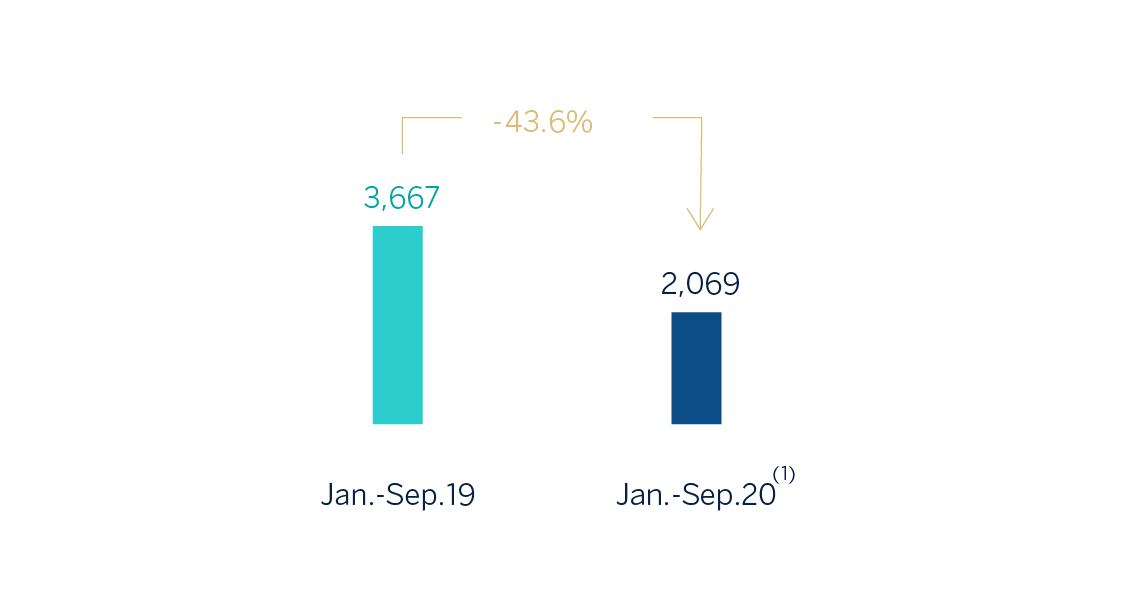 (1) Excluding the goodwill impairment in the United States.
(1) Excluding the goodwill impairment in the United States.
Net attributable profit breakdown (1)(Percentage. Jan.-Sep. 2020)
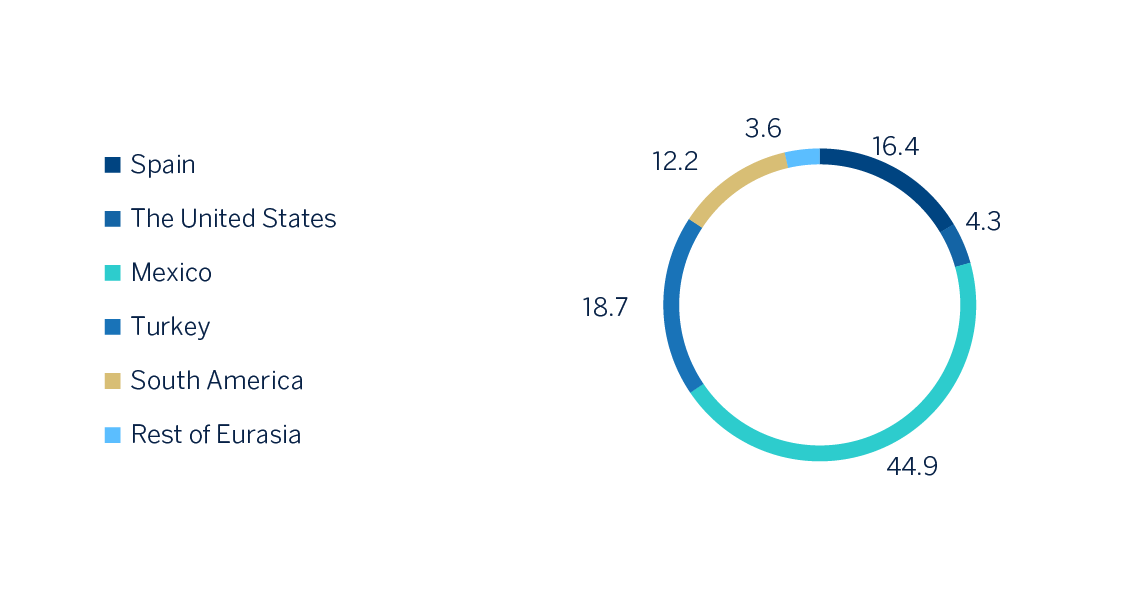 (1) Excludes the Corporate Center.
(1) Excludes the Corporate Center.
- The figure for loans and advances to customers (gross) fell by 4.0% compared to the end of the previous year, but with the corporate portfolio showing a slight growth.
- Customer funds grew by 0.6% in the first nine months of 2020, as a result of customers placing larger liquidity provisions with the Bank, which offset the lower balances recorded in off-balance sheet funds.
- The availability of substantial liquidity buffers in each of the geographical areas in which the BBVA Group operates and their management have allowed internal and regulatory ratios to be maintained well above the minimums required.
- BBVA Group has set the objective to maintain a buffer on its fully-loaded CET1 ratio requirement (currently at 8.59%) between 225 and 275 basis points. As of September 30, 2020, the CET1 fully-loaded ratratio stood at 11.52%, above the target management buffer.
Capital and leverage ratios (Percentage as of 30-09-20)
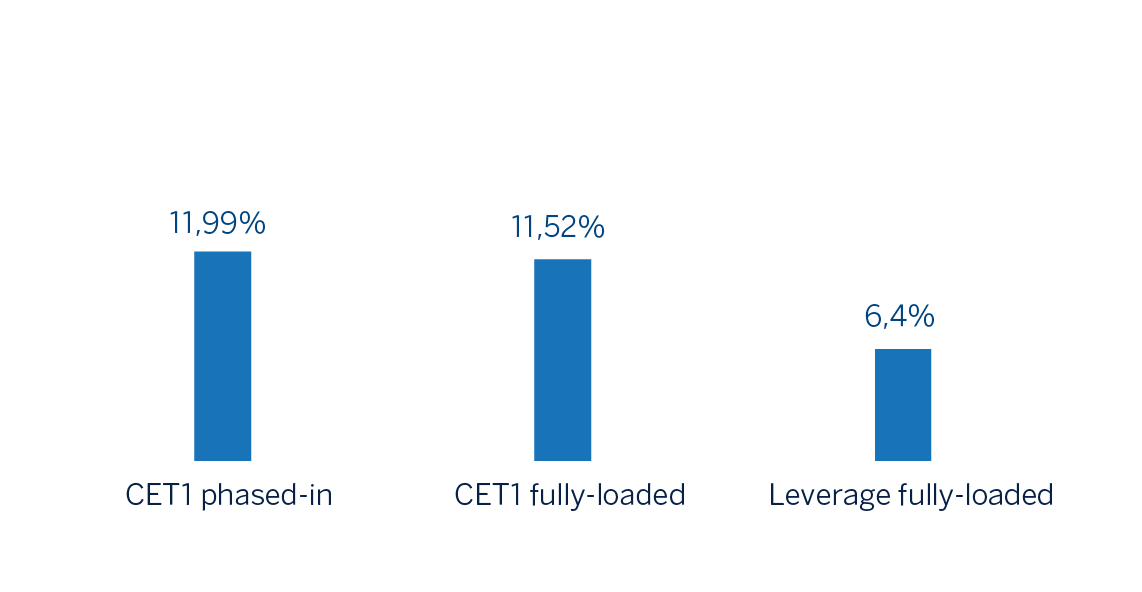
- The calculation of the expected credit losses accumulated as of September 2020 incorporates:
- The update of the forward looking information in the IFRS 9 models in order to reflect the circumstances created by the COVID-19 pandemic in the macroeconomic environment, which is characterized by a high degree of uncertainty regarding its intensity, duration and speed of recovery.
- granting of relief measures in the form of temporary payment deferrals for customers affected by the pandemic, as well as the option to grant lending with a public guarantee facility.
NPL and NPL coverage ratios and cost of risk (Percentage)
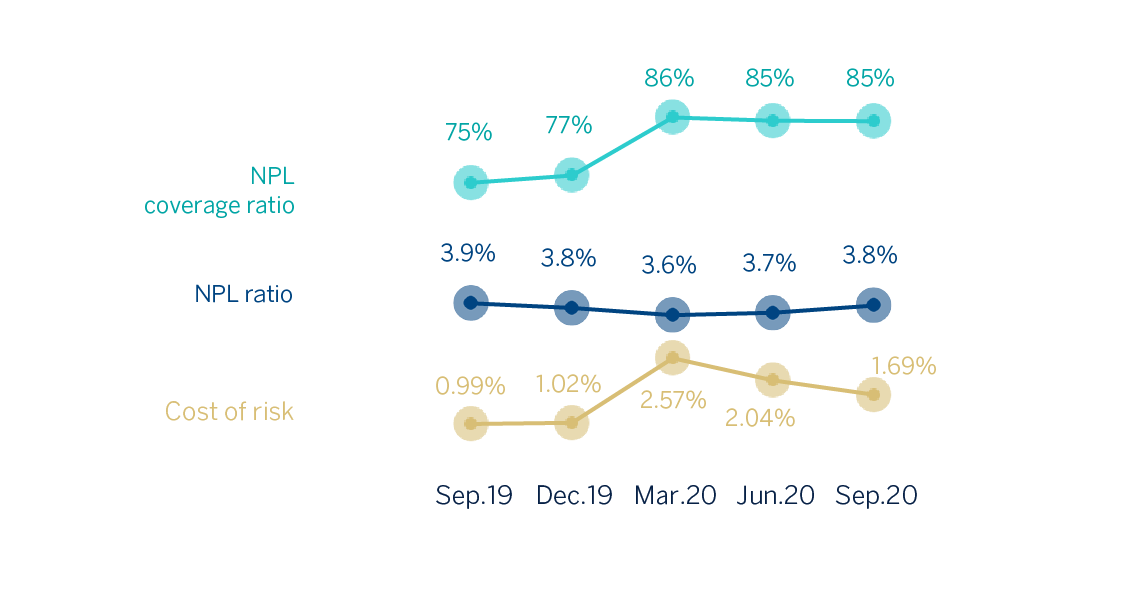
- BBVA's Purpose, to bring the age of opportunity to everyone, is more relevant than ever, as are our values: customer comes first, we think big and we are one team. This crisis has revealed the correct decision to opt for digitization, which has allowed the Bank to be closer to customers when they have needed it most, and reinforces our strategy. Therefore, our priorities remain unchanged; improve the financial health of customers, help them in the transition to a sustainable future, to grow in customers, seeking operational excellence and having the best and most committed team and the use of technology and data, will continue to be so the pillars on which the Group's strategy is based.
From the outset, BBVA has adopted a series of measures to support its main stakeholders. The main business continuity measures taken are:
- In order to serve customers, and since financial services are legally considered an essential service in most of the countries in which the Group operates, the branch network remained operational, with dynamic management of the network considering the evolution of the pandemic and activity. In addition, the use of digital channels and remote managers was encouraged. The data indicates that the COVID-19 crisis is accelerating digitization: At Group level, digital sales (measured in units) rebounded in March, and in April, reached 67.4%, with restrictions on the opening of branches in some of the countries where the Group operates, standing, in September 2020, at 63.6%, which very positively compares with the 59.9% in February. Also at the end of September, BBVA's digital customers accounted for 62% of the total and customers operating with the bank through their mobile phones accounted for 57% across the entire Group.
Digital and mobile customers (Millions)
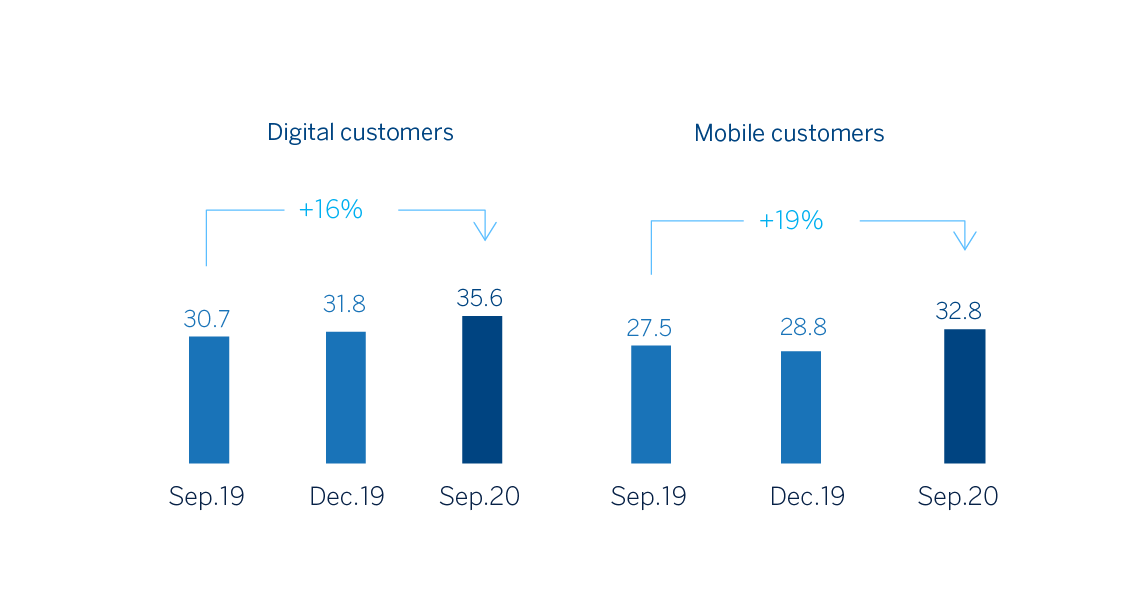
- With employees, recommendations from health authorities have been followed, including taking an early stance on promoting working from home. The priority in BBVA's return plan is to protect the health of our employees, customers and society in general. The return plan is being carried out following five principles: 1) cautiousness; 2) gradual return; 3) work shifts; 4) strict hygiene and safety measures; 5) creation of early identification protocols. The crisis is being handled dynamically; adapting the procedures in each geographical area which the Group is present to the current situation, based on the latest data available regarding the evolution of the pandemic, the business and the level of customer service, in addition to the guidelines set by local authorities.
- In terms of cybersecurity, the increase in remote work and digital transactions as a result of the coronavirus crisis has led to an increase in the risk of cyber attacks. To ensure data and corporate information protection, BBVA has established the appropriate measures and continues to strengthen its prevention and monitoring efforts, thus mitigating the possible associated risks.
The banks are a key part of the solution to the COVID-19 crisis. Among other support and responsibility measures, they include:
- BBVA has activated support initiatives with a focus on the most affected customers, regardless of whether they are companies, SMEs, self-employed workers or private individuals, and which includes, among others:
- In Spain, support for SMEs, self-employed workers and companies through credit lines and lines guaranteed by the Spanish Instituto de Crédito Oficial (ICO), extended until December 1, 2020, grace periods on loans to affected individuals (up to 12 months in residential mortgages for primary residence and up to 6 months in consumer lending), and moratorium of 3 months for citizens in social rental housing under the Social Housing Fund;
- In the United States, flexibility in the repayment of loans for small business and for consumer finance has been extended and certain fees and commissions for individual customers have been eliminated;
- In Mexico, grace periods up to 4 months on various credit products, fixed payment plans to reduce monthly credit card charges and suspension of Point of Sale (POS) fees to support retailers with lower turnover, as well as different support plans aimed at each situation for larger business customers;
- In Turkey, delay of loan repayments, interests and amortizations until December 31, 2020, without any penalty for private customers and extension of up to 6 months in the payment of principal on credits to companies;
- In South America, Argentina has provided micro-SMEs and SMEs with access to credit facilities to purchase teleworking equipment, funding facilities for payroll payments and refinancing unpaid credit card balances in 9 installments; Colombia has frozen the repayment of loans for individuals and companies for up to six months, and is offering a special working capital facility for companies; and in Peru, various measures were approved in order to support SMEs and customers with consumer loans or credit cards, including a payment term extension and an instalment reduction of up to 40%.
- To support society in this fight against the COVID-19 pandemic, BBVA donated €35m to purchase medical supplies, support vulnerable groups and promote research.
Business areas
Spain
€4,382 Mill.*
+3.2%
Millions of euros and year-on-year changes. Balances as of 30-09-20.
Highlights
- Activity growth, partly driven by the government support programs.
- Significant improvement in operating income due to an increase in NTI and commissions, as well as a decrease in operating expenses.
- Risk indicators contained.
- Net attributable profit affected by the level of the impairment on financial assets.
Results
Net interest income
2,675Gross income
4,382Operating income
2,105Net attributable profit
440Activity (1)
Performing loans and advances to customers under mangement
+0.8%Customers funds under management
+4.6%
Risks
NPL coverage ratio
NPL ratio
Cost of risk
(1) Excluding repos.
(2) Year on year changes.
The United States
€2,374 Mill.*
-2.4%
Millions of euros and year-on-year changes at constant exchange rate. Balances as of 30-09-20.
Highlights
- Increase in loans on the commercial portfolios, whereas retail segments have been affected by the pandemic. Strong increase in customer deposits.
- The cost of risk continues to improve.
- Positive evolution of fees and commissions and NTI.
- Lower net attributable profit due to a fall in net interest income and a significant increase in the impairment on financial assets line.
Results
Net interest income
1,708Gross income
2,374Operating income
960Net attributable profit
115Activity (1)
Performing loans and advances to customers under mangement
+6.3%Customers funds under management
+17.0%
Risks
NPL coverage ratio
NPL ratio
Cost of risk
(1) Excluding repos.
(2) Year on year changes at constant exchange rate.
Mexico
€5,231 Mill.*
+0.4%
Millions of euros and year-on-year changes at constant exchange rate. Balances as of 30-09-20.
Highlights
- Evolution of activity supported by the good performance of the wholesale portfolio.
- Improvement in the risk indicators.
- Stability of the main margins.
- Net attributable profit affected by the significant increase in the impairment on financial assets line.
Results
Net interest income
4,036Gross income
5,231Operating income
3,489Net attributable profit
1,204Activity (2)
Performing loans and advances to customers under mangement
+4.2%Customers funds under management
+14.4%
Risks
NPL coverage ratio
NPL ratio
Cost of risk
(2) Excluding repos.
(1) Year on year changes at constant exchange rate.
Turkey
€2,866 Mill.*
+34.8%
Millions of euros and year-on-year changes at constant exchange rate. Balances as of 30-09-20.
Highlights
- Credit growth driven by Turkish lira loans. Strong growth in foreign currency deposits.
- Outstanding performance of recurring revenue and efficiency ratio improvement.
- Small rise in the NPL ratio year-to date.
- Double digit growth in the main income statement margins.
Results
Net interest income
2,218Gross income
2,866Operating income
2,075Net attributable profit
503Activity (1)
Performing loans and advances to customers under mangement
+34.3%Customers funds under management
+36.3%
Risks
NPL coverage ratio
NPL ratio
Cost of risk
(1) Excluding repos.
(2) Year on year changes at constant exchange rate.
South America
€2,441 Mill.*
+0.1%
Millions of euros and year-on-year changes at constant exchange rates. Balances as of 30-09-20.
Highlights
- Activity growth impacted by support measures from the different governments.
- Year-on-year net interest income growth.
- Year-on-year decrease in NTI due to the sale of the Prisma stake in 2019.
- Net attributable profit affected by the increase in the impairment on financial assets line.
Results
Net interest income
2,069Gross income
2,441Operating income
1,397Net attributable profit (3)
326Activity (1)
Performing loans and advances to customers under mangement
+13.1%Customers funds under management
+19.4%
Risks
NPL coverage ratio
NPL ratio
Cost of risk
(1) Excluding repos.
(2) Year on year changes at constant exchange rates.
Rest of Eurasia
€388 Mill.*
+14.6%
Millions of euros and year-on-year changes. Balances as of 30-09-20.
Highlights
- Moderation of lending activity growth.
- Improved risk indicators.
- Increased recurring income and good performance of NTI.
- Reduction of operating expenses.
Results
Net interest income
159Gross income
388Operating income
184Net attributable profit
96Activity (1)
Performing loans and advances to customers under mangement
+13.7%Customers funds under management
+5.4%
Risks
NPL coverage ratio
NPL ratio
Cost of risk
(1) Excluding repos.
(2) Year on year changes.
* Gross income
News
Contact
 Shareholder attention line
Shareholder attention line912 24 98 21
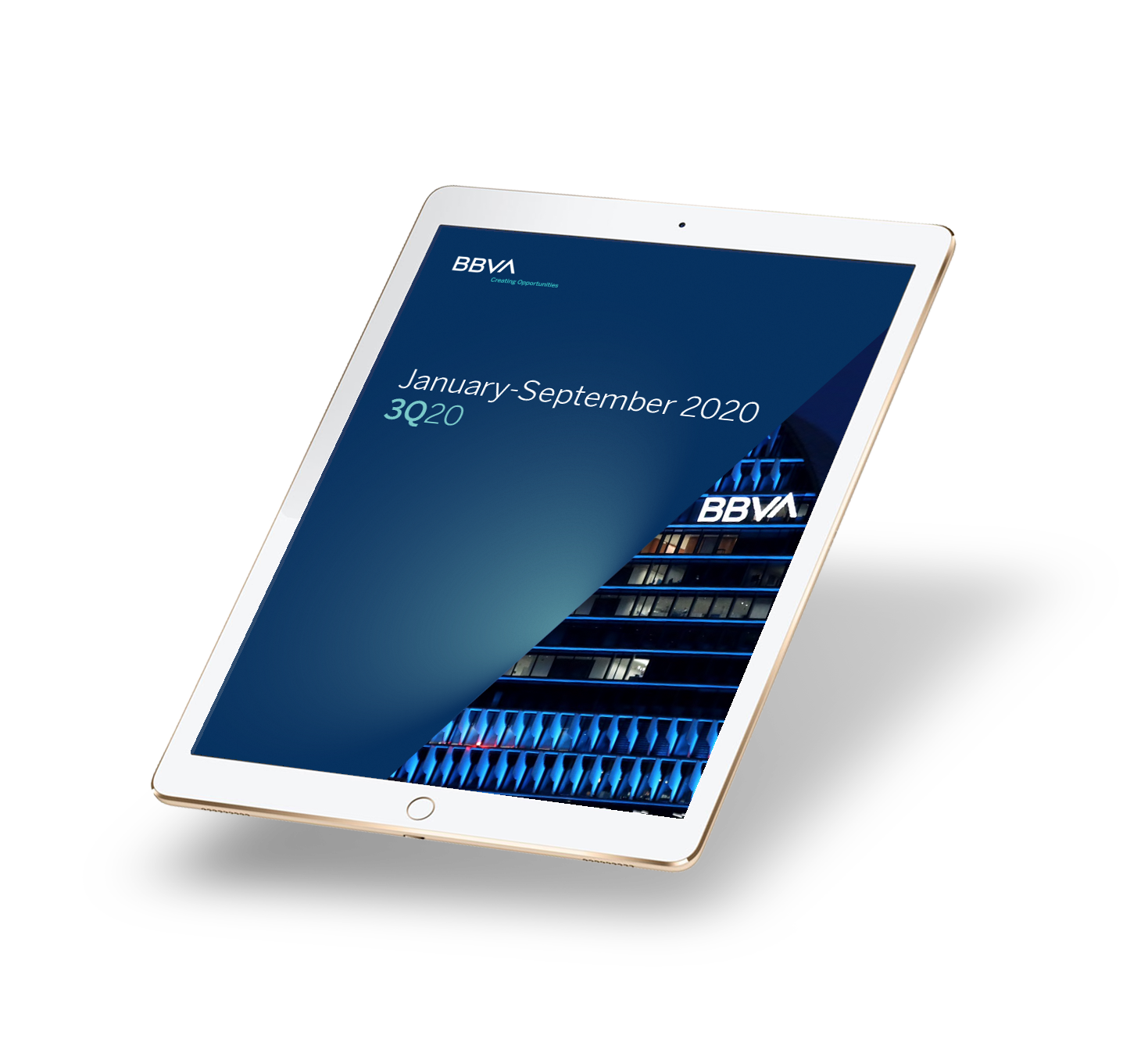

 Subscription service
Subscription service  Shareholder Office
Shareholder Office Contact email
Contact email